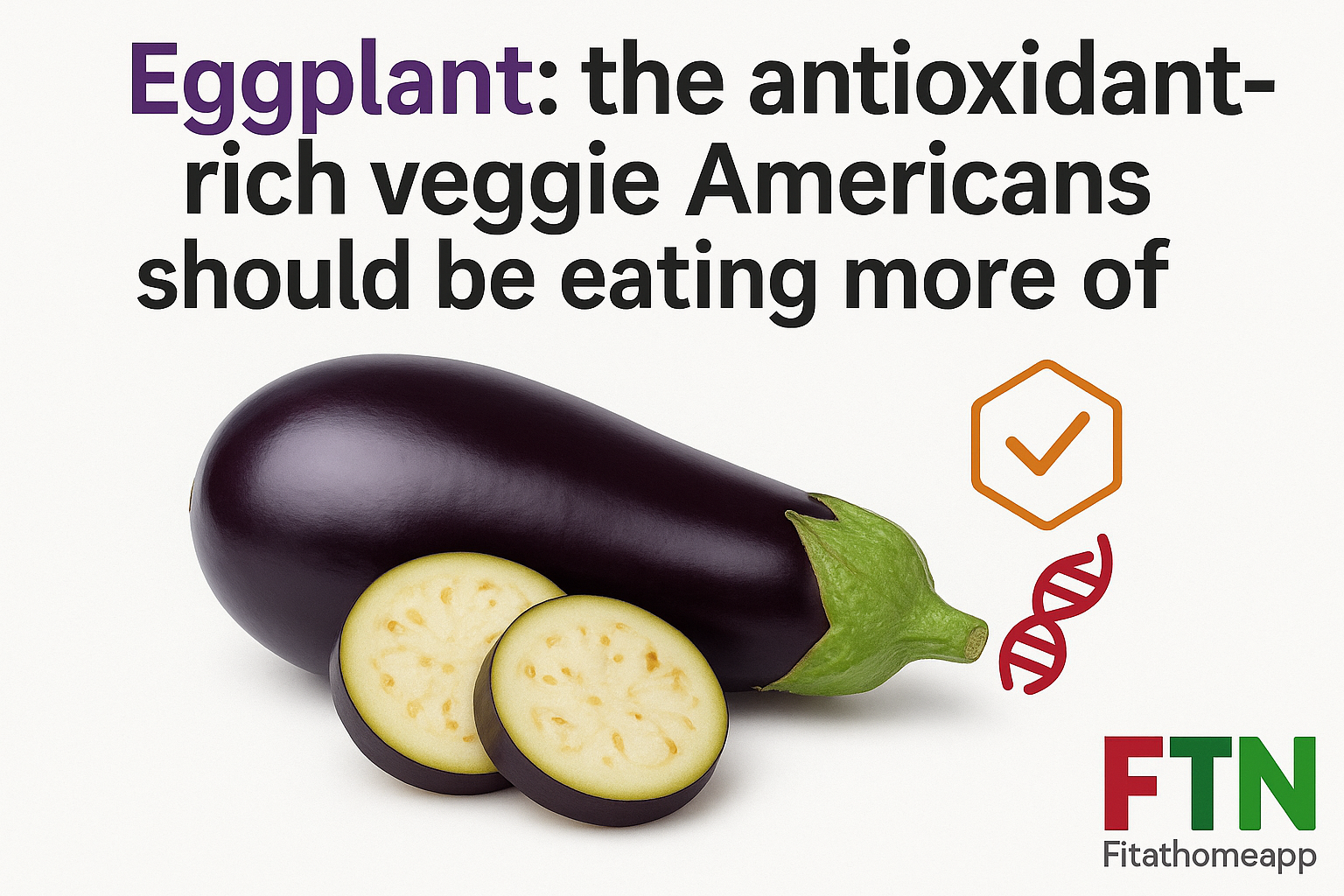Eggplant: The Underrated Superfood Every Healthy Kitchen Needs
Why Eggplant Deserves a Place in Your Diet
Eggplant, also known as aubergine, is one of the most overlooked yet incredibly nutritious vegetables you can include in your diet. Originally cultivated in India over 2,000 years ago, this colorful plant has made its way into kitchens worldwide—and for good reason. It’s low in calories, high in antioxidants, and packed with nutrients that support heart health, digestion, and weight management.
Eggplants come in various shapes and shades, from deep purple globes to slender Japanese varieties. Beyond their beauty, they’re rich in fiber, potassium, vitamins B1, B6, and C—making them a valuable part of a balanced diet.
A Nutrient Powerhouse With Heart-Healthy Benefits
One of eggplant’s greatest strengths lies in its antioxidant content, especially nasunin, which is found in the purple skin. Nasunin helps protect brain cells from oxidative stress and supports healthy blood flow. Another antioxidant, chlorogenic acid, offers anti-inflammatory and anti-diabetic benefits and may even help with weight control.
In terms of heart health, the fiber and potassium in eggplant can help reduce cholesterol and improve blood pressure. These benefits make it an excellent food for those looking to reduce their risk of cardiovascular disease without relying on costly superfoods.
Weight Management and Blood Sugar Control
Trying to eat lighter without sacrificing satisfaction? Eggplant is your friend. With only about 35 calories per cup when cooked, it’s filling without being heavy. The fiber content helps control appetite and regulate blood sugar—ideal for those managing diabetes or aiming to maintain a healthy weight.
It also fits seamlessly into vegetarian, vegan, and low-carb lifestyles. Thanks to its meaty texture, eggplant can even serve as a satisfying meat alternative in many dishes.
Easy and Delicious Ways to Cook Eggplant
Eggplant’s biggest appeal might just be its versatility. Whether you grill it, roast it, bake it, or blend it into dips like baba ghanoush, there are endless ways to enjoy this vegetable. Popular dishes include:
Grilled eggplant slices with olive oil and herbs
Eggplant Parmesan, baked with marinara and cheese
Ratatouille, a hearty Mediterranean stew
Stuffed eggplant, filled with quinoa or lean meats
Roasted eggplant tacos, for a modern twist on a classic favorite
Pro tip: Lightly salting sliced eggplant before cooking helps draw out any bitterness and improves texture.
Debunking the Myths: Eggplant Is Not Bitter or Difficult
Many avoid eggplant due to its reputation for being bitter or difficult to prepare. However, modern varieties are much milder, and proper cooking techniques eliminate any undesirable flavors. Don’t be intimidated—eggplant is easier to cook than it gets credit for!
It’s also safe and nutritious for most people, despite belonging to the nightshade family. Unless you have specific allergies or sensitivities, there’s no reason to avoid it.
Sustainable, Affordable, and Locally Available
Eggplant is also a great option for eco-conscious consumers. It requires fewer resources to grow than many other crops and is widely available in local markets. Buying it locally not only reduces your environmental footprint but also supports your community’s farmers.
Plus, it’s budget-friendly. Compared to trendier superfoods, eggplant offers excellent nutritional value at a fraction of the cost.
Final Thoughts: Embrace Eggplant for a Healthier You
Eggplant is a nutrient-rich, low-calorie vegetable that can benefit your heart, brain, digestion, and overall wellness. Its flavor, texture, and versatility make it a great choice for creative cooking, whether you’re following a specific diet or just looking to eat healthier.
So next time you’re at the grocery store, don’t pass up this purple powerhouse. From comforting classics to modern dishes, eggplant can elevate your meals and support a more vibrant, balanced lifestyle
Personal Take on the Video
This video spotlights eggplant as more than a side dish—it positions it as a key recovery food by emphasizing its antioxidant properties that help muscles bounce back.Antioxidant Protection Nasunin—found in eggplant skin—actively protects cell membranes from oxidative damage.
Heart & Brain Health Compounds like chlorogenic acid help reduce inflammation and support healthy blood flow.
Weight & Blood Sugar Support Low-calorie, fiber-rich, and stabilizes blood sugar—great for satiety and metabolic balance
The Relationship Between Eggplant and Tomato: Nutritional and Botanical Insights
Eggplant and tomato, two staples in kitchens worldwide, share more than just their culinary versatility—they are botanically related as members of the Solanaceae family, commonly known as the nightshade family. This family includes a variety of important vegetables and fruits, such as potatoes, peppers, and tobacco, but eggplant and tomato hold a special place due to their widespread use and rich nutritional profiles.
From a botanical standpoint, eggplant (Solanum melongena) and tomato (Solanum lycopersicum) are closely linked species within the Solanaceae family. Despite their different appearances and textures, both vegetables share similar growing conditions and biological traits. They thrive in warm climates, prefer well-drained soil, and require ample sunlight to develop their characteristic flavors and colors. Their flowering patterns are also alike, with both producing small, star-shaped flowers before fruit development.
Nutritionally, eggplants and tomatoes complement each other remarkably well, making them a popular pairing in many dishes around the world. Tomatoes are famously rich in lycopene, a powerful antioxidant linked to reduced risks of heart disease and certain cancers. Lycopene gives tomatoes their vibrant red color and offers protective benefits by neutralizing harmful free radicals in the body. Eggplants, on the other hand, are an excellent source of nasunin, an anthocyanin antioxidant concentrated in the purple skin of the fruit. Nasunin is known for its ability to protect cell membranes from oxidative damage and has been studied for its potential to improve brain health and reduce inflammation.
Both eggplants and tomatoes also provide significant amounts of dietary fiber, vitamins, and minerals essential for maintaining overall health. They are low in calories and fat, making them ideal choices for weight management and heart health. Tomatoes contribute vitamin C, potassium, and folate, while eggplants offer manganese, B vitamins, and small amounts of copper and magnesium.
Culinary traditions across various cultures often combine eggplant and tomato due to their complementary flavors and textures. Mediterranean dishes such as ratatouille and caponata highlight this pairing, blending the sweetness and acidity of tomatoes with the mild, slightly bitter taste of eggplant. This combination not only enhances taste but also amplifies nutritional value, allowing consumers to benefit from a broader spectrum of antioxidants and nutrients.
Moreover, the relationship between eggplant and tomato extends beyond nutrition and botany—it influences agriculture and farming practices. Both crops face similar pests and diseases, including fungal infections and insect attacks, which means integrated pest management strategies often target both simultaneously. Understanding their shared vulnerabilities helps farmers optimize crop yields and maintain sustainable production.
In conclusion, the connection between eggplant and tomato is multifaceted, spanning botanical classification, nutritional synergy, culinary traditions, and agricultural practices. Their shared membership in the Solanaceae family underscores common traits and growth requirements, while their distinct antioxidant profiles provide complementary health benefits. Incorporating both eggplants and tomatoes into your diet not only adds variety and flavor but also delivers a powerful combination of nutrients that support heart health, reduce inflammation, and promote overall wellness. Whether enjoyed in a fresh salad, a hearty stew, or a vibrant pasta sauce, eggplant and tomato together exemplify the richness and diversity of nature’s bounty.

